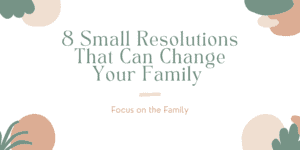I don’t wake up angry. It’s not like my eyes open and I think to myself, I want to get mad at somebody today. I don’t. But I can go from happy to grumpy to yelling within minutes. Why? Because I’m surrounded by people who push my buttons: my family.
Just this morning the soundtrack of my life included an argument between my two daughters. My younger daughter was upset that her sister wasn’t in the mood to loan her boots — a big problem in the world of teen girls. Tears ensued. I demanded they go upstairs to work it out. When my husband awoke to the boot debacle, he commented, “Every morning there’s some kind of drama. Can’t you all just be nice to each other?”
That was it. I had been lumped into the “you all” category when I was simply responding to the drama that our kids brought to our morning!
My emotions had been ratcheted up to the point where the slightest additional stress could cause me to come completely unglued.
However, this morning I didn’t. And that’s amazing since I literally felt like I had firecrackers in my blood.
But, over the past couple of years I’ve been making imperfect progress by learning how to attack the issues without attacking the people I love. If you’ve ever struggled with getting angry, here are a few insights that might help you, too.
Feelings are indicators, not dictators.
My feelings can indicate there is a problem to address but shouldn’t dictate how I react to a situation. I need to see the chaotic feelings as a call to action, working to put systems in place to better handle problems.
With anger issues, I used to yell until everyone else got quiet. Now I control what I can (my emotions and my reactions) instead of getting frustrated with the things I can’t control (arguing daughters).
She who holds the tongue, holds the power.
When I yell, I communicate to my family that they have the power to make me act crazy. And I don’t want my kids, my husband, the family dog or anyone else to have that kind of power over me. So, in that split second before I yell, I try to insert a pause. Pausing reminds me that God gave me emotions to experience life — not destroy it. Pausing helps me look for a little perspective. And best of all, pausing allows for the Holy Spirit to intervene in my response.
Consequences yell, so I don’t have to.
When I see a police officer sitting on the side of the road with a radar gun, I slow down because I know there will be consequences if I don’t. If he just stood on the street and yelled and waved his arms without ever dishing out consequences, I wouldn’t feel nearly as motivated to pay attention to him. The same is true for dealing with others.
Consequences are powerful and effective tools, but they have to be realistic and consistent. So, the time to think about these isn’t in the heat of the moment. Instead, I think about logical consequences for reoccurring issues before they trigger angry feelings. This means that the next time my kids speed toward doing things they shouldn’t, I’ll have the equivalent of a ticket ready to serve.
Trust me, I still don’t do this perfectly. But I am getting better. Less frustrated, less angry. And that’s so much better than waking up dreading what the day will bring.
For more on how to manage your anger and tendency to explode, check out Lysa TerKeurst’s book, Unglued.




















